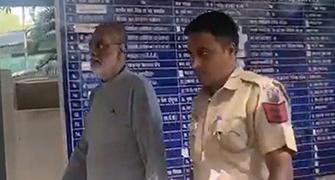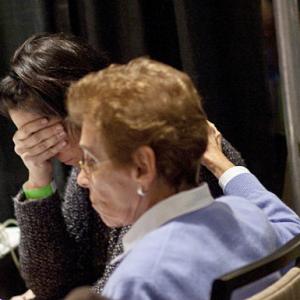The 20th Law Commission has mooted the concept of shared parenting and joint custody rights to a child in case the parents opt for a divorce, both parents have equal access to the child and there should be no restricted visiting periods for a parent who does not have rights.
While these sound good on paper, we need a more comprehensive report that would look into the whole issue of children's rights, lawyers tell Rashme Sehgal.
Illustration: Uttam Ghosh/Rediff.com

Spiralling divorce cases have resulted in the unfolding of bitter battles over child custody, with children often being treated as ping pong balls to be tossed from one parent to the other. These battles are being fought across all cross-sections of society.
Take the case of businessman Ramesh, who was willing to hand over his wife Rs 2 crore (Rs 20 million) as settlement for a divorce by mutual consent. The wife, a businesswoman herself, demanded a much larger amount and in order to put pressure on her former spouse to meet this demand, she denied him access to their two young children, a son and a daughter.
The matter was taken to court where the judge rebuked the mother saying no parent could play the role of an 'extortionist' and that she could not deny a father access to his children.
On the other end of the spectrum is the example of another rich jeweller who wanted to teach his estranged wife, a homemaker, a lesson or two and not give her any maintenance. Again, the court had to intervene to ensure the husband gave his wife enough to ensure his two daughters and wife were able to lead a comfortable life.
While parents are natural guardians of their children, the primary caretaker of young children is more often the mother who takes care of the child's emotional and educational needs. This has made retired Justice A P Shah, chairman of the 20th Law Commission, propose sweeping amendments to the existing guardianship and custody law in order to make it more compatible with changing times.
The draft law has mooted the concept of shared parenting and joint custody rights to a child in case the parents opt for a divorce.
The Law Commission has mooted that both parents would have equal access to the child and there should be no restricted visiting periods for a parent who does not have rights.
It has further proposed statutory guidelines to judges on determining child welfare rights in case of joint custody, primarily because this has been a grey area. At present, there is lack of judicial consensus on what exactly constitutes the welfare of a child, especially in cases of protracted custody battles.
Some of the recommendations include empowering the courts to fix a specific amount for child support up to the age of 18 years which can go up to 25 or more in case the child suffers from a mental disability.
An attempt has also been made to iron out the disparity in the relevance accorded to the principle of welfare of children by different legislation regulating custody and guardianship.
The existing Guardian and Wards Act, 1890, and the Hindu Minority and Guardianship Act, 1956, had both treated the father as the child's natural guardian. The Guardians and Wards Act of 1890, which regulated custody of children irrespective of their religion, continues with the supremacy of the father's right in guardianship and custody.
Even the other law that regulates custody, the Hindu Minority and Guardianship Act of 1956, does not treat the mother on an equal footing, with the father as the natural guardian of the child.
The new framework has listed the legal framework required to address how custody issues should be handled, what factors should be relevant in decision-making, and what should be the process of dispute resolution between parents over children.
At present there are no codified rules governing custody. Decision-making in this area is based on the presumption that welfare of the child essentially lies in custody being awarded to any one of the parents.
Advocate Malvika Rajkotia has expressed disappointment with the manner in which the Law Commission has dealt with the issue of joint custody.
"It's a very complex matter, but has been dealt with in a very summary manner, missing out on some important corollaries. We needed a more comprehensive report that would look into the whole issue of children's rights. This draft has not addressed the modalities of this subject," she said.
"In the West," Rajkotia explained, "co-parenting arrangements in a nuclear family are a necessity because parents there (seldom have domestic help and) need a respite. In The Netherlands, the matrimonial house (where the parents lived) remains with the child."
"This kind of co-parenting is based on the premise that everyone is behaving well. But this need not be the case. The child is often treated as a property of one parent, with attempts being made to diminish the importance of the other parent. Mothers tend to do this. Fathers will retaliate by trying to give a pittance in maintenance," Rajkotia added.
Advocate Anu Bagai agrees that the entire issue of joint custody remains an extremely tricky domain. "I had to move the Delhi high court against a judgment where a mother was asked to take care of a child from Monday to Thursday while the father was given care from Friday to Sunday. The child could not cope with this gruelling schedule. One parent has to remain the primary caregiver."
The other problem, Bagai argues, is that since divorce creates a lot of animosity, joint custody arguments on where the child should study, which activity he should participate in, should not accelerate to an extent that these adversely impact the child.
Divorce lawyer Prosenjit Banerjee cites how warring parents can create a situation of "complete parental alienation, especially since this seems to be on the rise." "A three year old kid is at a very impressionable age. If a father starts badmouthing the mother, the child whose dependence on his mother is very high, will end up feeling traumatised. If the mother does the same, the child will be in a very difficult situation because the child is fearful of losing his parents."
Banerjee believes that "a child above the age of 10-11 should be given the intelligent preference to decide which parent he wants to live with. And the courts are often supportive of such a decision."
Banerjee also warns of how some kids opt to play one parent against another. "This is something parents should be able to see through but often do not," he added.
Advocate Anjali Verma agrees because she cites the examples of both fathers and mothers who, if they choose to marry a second time, will "on occasion opt to give up their rights on their children, leaving the kids to be brought up with their former spouses. The court has to decide what is in the best interests of the child."
The Shah Commission recommendations on joint custody also need to be harmonised with the Acts being used by other communities.
All the personal law matrimonial statutes make provisions for dealing with issues of child custody. These provisions in the matrimonial Acts can be invoked only when some proceedings are pending under the Act.
The Guardian and Wards Act is nor religion-specific, and, for instance, a Muslim mother can apply for child custody under Section 25 of this Act. But the court also give consideration to the personal laws of different communities including the Muslim Personal Law.
"There has to be clarity on how Muslims will deal with this issue," Banerjee pointed out. "The conflict in different statutes must be removed and the law must apply equally to all communities."
Most women activists and lawyers working in this field agree that while the old family arrangements are being dismantled, new alternatives have not been put in place. The key issue of the role of counsellors and in what way their assistance will be sought by both spouses also needs to be spelt out in greater detail.
These recommendations require a much wider debate within civil society since once they become translated into law, they will impact the lives of thousands of children and their estranged parents.








